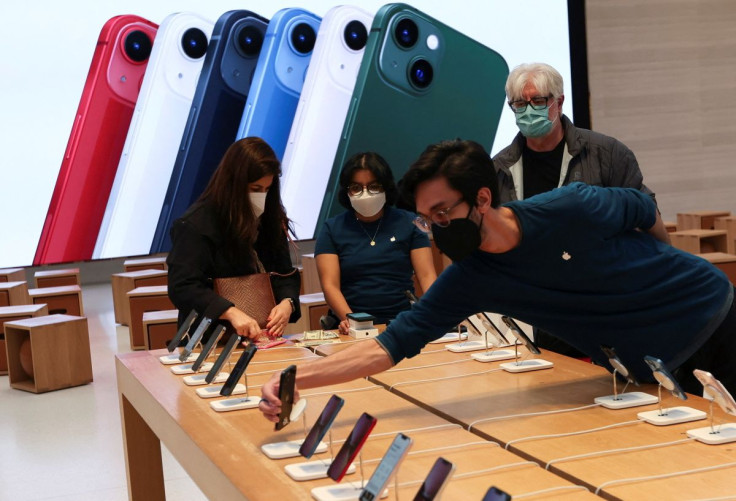Apple Beats Sales Estimates With Big Bumps In IPhones, Services

Apple Inc on Thursday reported record fiscal second-quarter sales and profit that beat Wall Street estimates as it managed chip shortages and consumers snapped up new iPhones.
Sales rose 19% in the Americas and were up by single-digits in Europe and China.
Apple shares rose 2.3% in after-hours trading.
The Silicon Valley-based iPhone maker, which is the world's largest company by market capitalization, is aiming to maintain high demand for the iPhone and other hardware while growing sales from services, including music and video subscriptions.
The latest results show it is making ground on both goals, as it beat sales expectations for every unit beside accessories.
Apple Chief Financial Officer Luca Maestri in a release cited "continued strong demand for our products," and a record high for sales of services.
Apple's overall fiscal second-quarter revenue was $97.3 billion, up 8.6% from last year and higher than analysts' average estimate of $93.89 billion, according to Refinitiv data.
Apple had warned less favorable foreign exchange rates and different timings of product launches from past quarters would cut sales growth.
Quarterly worldwide phone sales revenue was $50.6 billion, a 5.5% increase from a year ago, and ahead of the average estimate of $47.88 billion. Services, Apple's second-biggest segment after iPhones, increased sales 17% to $19.8 billion, just beating the average estimate of $19.71 billion.
Profit was $25 billion, or $1.52 per share and easily topped analysts' expectations of $23.2 billion and $1.43 per share.
Apple also announced a 5% rise in its dividend to $0.23 per share and board approval to buy back an additional $90 billion in shares.
Investors have been bracing for drops in consumer spending on tech gadgets and services as the war in Ukraine and other factors drive up the cost of oil, food and other staples.
Some consumers also have put more money into travel and entertainment outside their homes as COVID-19 outbreaks become less deadly, eating into home technology budgets.
Maestri said in an interview that the war in Ukraine affected revenue as Apple withdrew from Russia, but he declined to specify an amount. He said the hit to sales would be greater in the current quarter.
Asked about rising inflation, Maestri said demand, particularly for iPhones, had been higher than the company had anticipated at the start of the quarter. Inflation was affecting expenses, he said.
Maestri noted that the app store, music, cloud and Apple Care services each set all-time records for sales.
Remote work also has cut the need for pricey, high-end phones and upgrades as people commute less.
But remote work has benefited other businesses.
Apple said iPad sales fell 2% to $7.65 billion due to supply-chain constraints. They were still above analysts' average estimate of $7.14 billion.
Revenue from Mac computers, also facing supply-chain issues, rose 14.7% to $10.4 billion, compared with estimates of $9.25 billion.
Sales of wearables, home speakers and accessories rose 12% to $8.8 billion, compared with estimates of $9.05 billion.
Maestri said Apple's watch and AirPods sold well, and attributed the miss to seasonal variability in demand for other accessories.
But new lockdowns in China and Taiwan, where many parts and iPhones are produced, could bring new obstacles in terms of supply and demand in the current quarter.
The services business is vulnerable to antitrust sanctions in the United States, Netherlands, South Korea, South Africa and many other countries that are weighing whether the company's fees are too high.
Apple said it now has 825 million paying subscribers across its at least seven subscription offerings, up by 40 million from 785 million last quarter. Its growth comes as rivals such as Netflix Inc report subscriber losses.
Labor unrest could newly affect Apple, too. More than 70% of the over 100 eligible workers at an Apple store in Atlanta last week backed a filing for an election to become the company's first U.S. shop to unionize.
© Copyright Thomson Reuters 2024. All rights reserved.





















